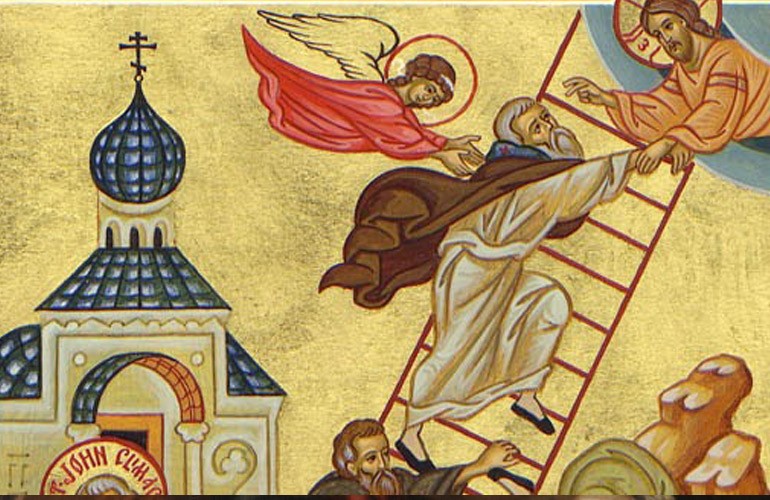– Anastasios
When we talk of Saint John Climacus (525-605), we talk of a great protagonist of monasticism. He was a monk a the Mount Sinai Monastery, where he entered when he was 16. His monastic life at the beginning was more of a hermitic character. He was then abbot of that monastery. Because of his work called The Ladder of Divine Ascent he was called Climacus (ascending). His book had a lot of success, making him a reference for those looking for excellent teachings in spirituality.
He knew that God was the life for everyone, as he said in the treatise mentioned above: “God belongs to all free beings. He is the life of all, the salvation of all—faithful and unfaithful, just and unjust, pious and impious, passionate and dispassionate, monks and seculars, wise and simple, healthy and sick, young and old—just as the diffusion of light, the sight of the sun, and the changes of the weather are for all alike; ‘for there is no respect of persons with God’.”
On the need for spiritual direction he added: “Those of us who wish to go out of Egypt and to fly from Pharaoh, certainly need some Moses as a mediator with God and from God, who, standing between action and contemplation, will raise hands of prayer for us to God, so that guided by Him we may cross the sea of sin and rout the Amalek of the passions. That is why those who have surrendered themselves to God, deceive themselves if they suppose that they have no need of a director. Those who came out of Egypt had Moses as their guide, and those who fled from Sodom had an angel. The former are like those who are healed of the passions of the soul by the care of physicians: these are they who come out of Egypt. The latter are like those who long to put off the uncleanness of the wretched body. That is why they need a helper, an angel, so to speak, or at least one equal to an angel. For in proportion to the corruption of our wounds we need a director who is indeed an expert and a physician.”
The treatise is a good guide to climb the ladder to spiritual perfection, a perfection that we will not attain in this life but that will hopefully be lived in the other life. This tension to perfection is what Christian life is for for everyone. But John Climacus warns us that our time to do good is limited: “Let us eagerly run our course as men called by our God and King, lest, since our time is short, we be found in the day of our death without fruit and perish of hunger. Let us please the Lord as soldiers please their king; because we are required to give an exact account of our service after the campaign. Let us fear the Lord not less than we fear beasts. For I have seen men who were going to steal and were not afraid of God, but, hearing the barking of dogs, they at once turned back; and what the fear of God could not achieve was done by the fear of animals. Let us love God at least as much as we respect our friends. For I have often seen people who had offended God and were not in the least perturbed about it. And I have seen how those same people provoked their friends in some trifling matter and then employed every artifice, every device, every sacrifice, every apology, both personally and through friends and relatives, not sparing gifts, in order to regain their former love.”
This passage about the strategy of God with souls is really meaningful: “The Lord designedly makes easy the battles of beginners so that they should not immediately return to the world at the outset. And so rejoice in the Lord always, all servants of His, detecting in this the first sign of the Master’s love for us, and a sign that He Himself has called us. But when God sees courageous souls, He has often been known to act in this way: He lets them have conflicts from the very beginning in order to crown them the sooner. But the Lord hides the difficulty of this contest from those in the world. For if they were to know, no one would renounce the world.”
This is a book certainly to be rediscovered and considered not only by monks, but by all those that want to progress in their spiritual life.


 Follow
Follow


